Advertisement
The Fastest Man Who Won't Be Running At The Olympic Marathon Trials
Resume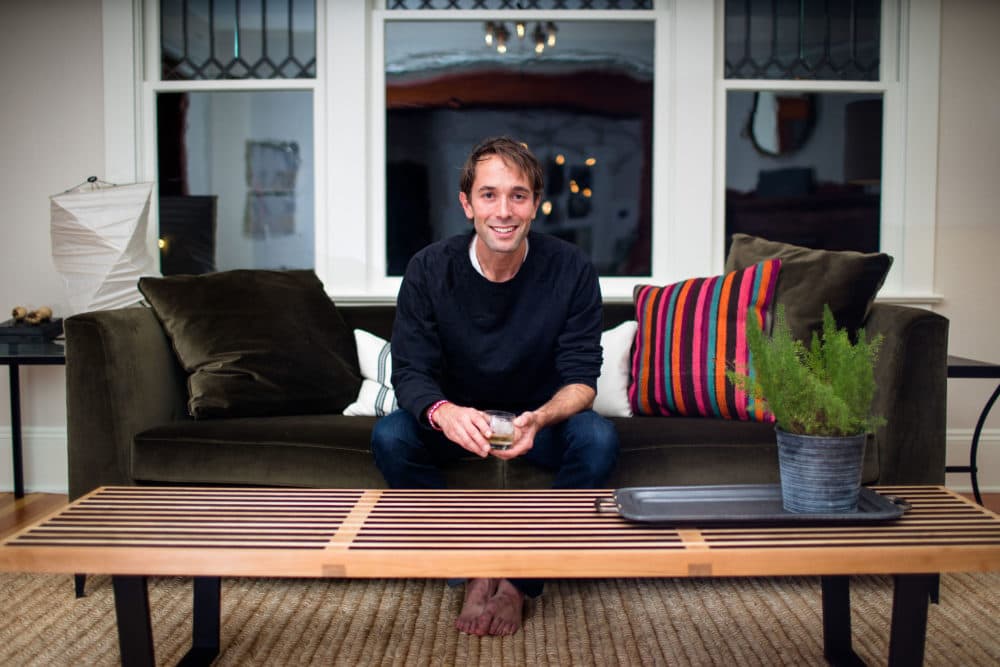
This weekend, this country’s fastest marathoners are gathered in Atlanta, Georgia, for the U.S. Olympic Trials Marathon. Earning a spot on the start line at the men’s race is simple: run a marathon in 2 hours and 19 minutes or less anytime during the two-and-a-half year qualifying window and you’re in.
Runners spend years preparing for an Olympic Trials qualifying attempt. Sometimes it takes more than one attempt to qualify.
'I Didn't Really Have Marathon Aspirations'
Every runner is a clock in motion, marking the miles in minutes and seconds. And elite marathoners are a special kind of timepiece. They're the Swiss watches of the running world: exquisitely accurate metronomes who have spent years calibrating their footfalls and heartbeats to the steady tick of a clock.
Peter Bromka ran his first marathon in Boston in 2005 while a senior at Tufts University. He finished in 3 hours and 8 minutes.
"It was hard," Peter recalls. "I didn't run as well as I had hoped, and I just thought, 'OK, that was wild. I guess we're done,' 'cause I didn't really have marathon aspirations."
After Boston, Peter moved across the country to Portland, Oregon, leaving behind the marathon for the better part of a decade. But the 2013 Boston Marathon bombing drew him back to the event and, despite the fact that he hadn’t been training with any real purpose for years, he signed up to run the race again in 2014.
"I basically said to some friends, 'I'm training for Boston. Who else is training for Boston?' And it's like a Fight Club, almost. They say, like, 'Show up on this island, over this bridge at 7 a.m. on a Saturday, and there'll be other guys there.' "
Finding 'The Big, Shiny, Bright Star'
After the 2014 Boston Marathon, Peter kept his eyes open for training partners who could match him in speed and intensity. His search ultimately led him to the Bowerman Track Club Elite, one of the country's premiere programs.
"From day one I thought of it as a team endeavor," Peter says. "It's what's made marathoning so meaningful to me. So there was this steady progression of taking the marathon more seriously, training for it more seriously and also coming to understand what it took to go faster, both mentally and physically."
Year after year, Peter ramped up his training. He ran more miles and gained strength and speed. The results showed on the clock.
In 2015 he ran a marathon in 2:34.
A year later he ran 2:29.
In the spring of 2017: 2:28.
In December of that year, Peter and his Bowerman Track Club teammates went to the California International Marathon in Sacramento. Peter ran 2:23 — just four minutes off the U.S. Olympic Trials qualifying time.
At age 37 he was running faster than ever.
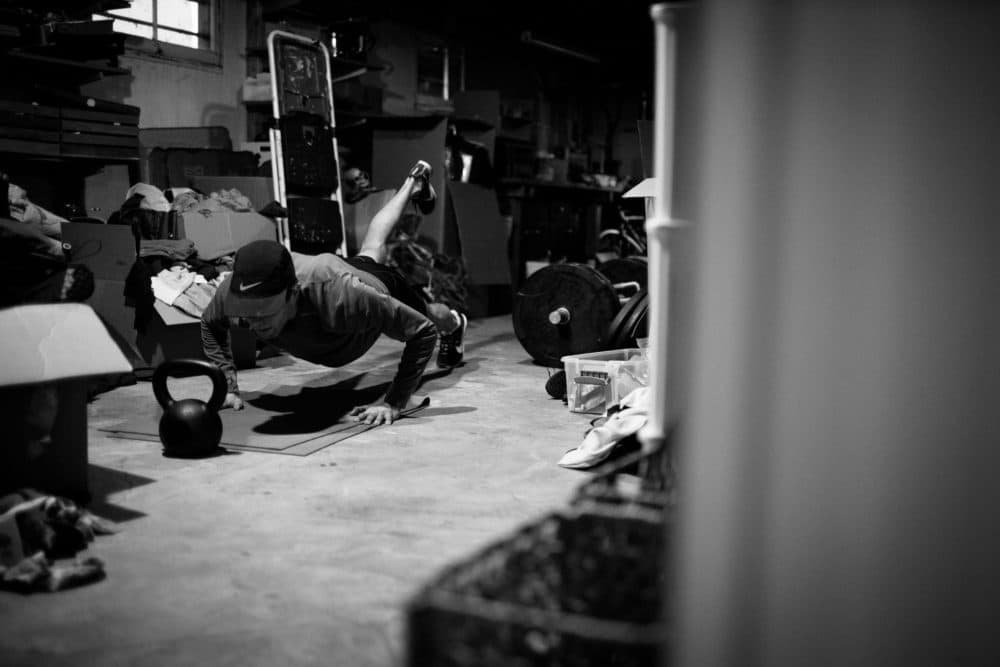
By the fall of 2018, Peter and his teammates had set their sights on a return to the California International Marathon in December to try to run a qualifying time for the Olympic Trials in Atlanta a little over a year later.
"I mean, if you're a marathoner who has run a handful of races and then maybe achieved a few of your goals, you start to wonder, like, 'What is next? Where does this lead?' " Peter says. "It's hard to do this sport. And so there needs to be some big, shiny, bright star that you're chasing.
"And, once it became clear to us that the Olympic Trials qualifier might just maybe be possible, it was like a spark of life for our daily athleticism."
'Let's Do This Again!'
Peter and his teammates marched through 12 weeks of workouts designed to calibrate their bodies to running the precise pace they’d need to hold to achieve the trials qualifying standard: five minutes and 18 seconds per mile for 26.2 miles.
On the day of the race, the plan was simple.
"I knew that all I was going to do in this moment of discovery of if it was even possible [was] just to stay with my teammates as long as possible," Peter says. "Just hang on."
And he did ... until the 15-mile mark — well past halfway but still a long way from the finish line.
"Once it became clear to us that the Olympic Trials qualifier might just maybe be possible, it was like a spark of life for our daily athleticism."
Peter Bromka
Peter’s teammate Patrick Reaves, who would go on to qualify that day, accelerated on a downhill and opened up a five-second gap that proved impossible to close.
"By the very end, I just stopped looking at my watch entirely, because it became clear to me that there was no information I was going to see on my watch that mattered," Peter says. "I was already at 10 or at 11 in terms of effort. I was just going to have to go as hard as I could for the final three to four miles."
Peter finished in two hours, 19 minutes and 40 seconds — more than three minutes faster than he'd ever run a marathon and just 40 seconds off the Olympic Trials qualifying time.
"Before I knew it, like, before I was at the airport, I was already like, 'Let's do this again!' " Peter remembers. "It's, like, our plan didn't quite get us to the moon but, man, if we're not really darn close, and, let's do it again."
The Meticulous Training
In the summer of 2019, the Olympic Trials were less than a year away. Peter was trying to be casual about building up to a second attempt at the qualifying time. But that was tough.
"Truth be told, I would think about the final 10K of the marathon in December like every day," Peter says, "and how it was going to require more strength and more focus than the previous year or than ever before."
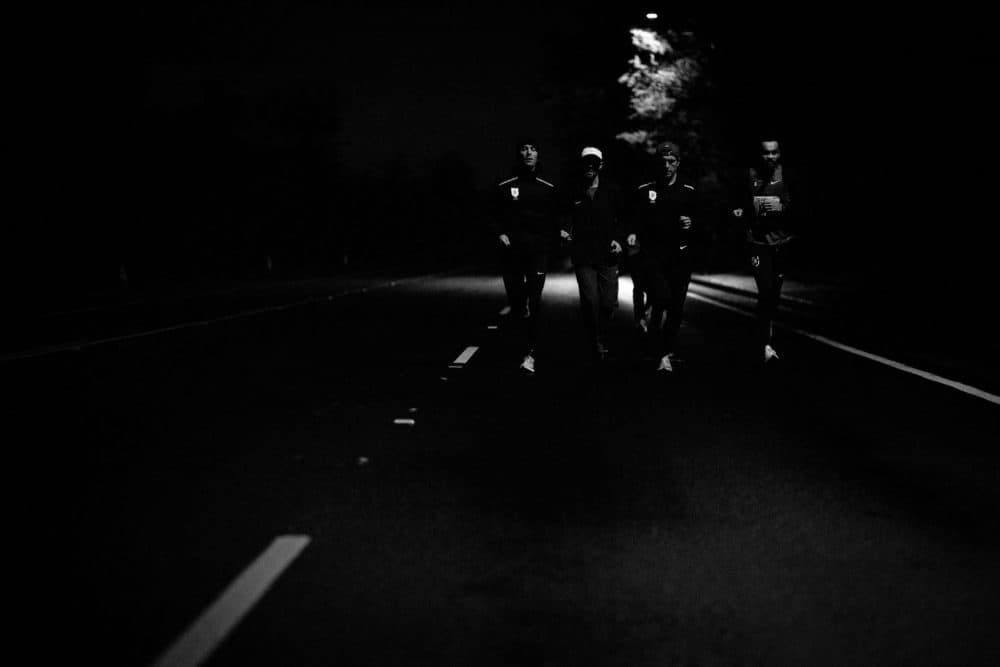
Come September Peter was locked back in to the meticulous arithmetic of marathon training: accumulating weekly mileage, shedding seconds from splits, multiplying the intensity and duration of workouts and dividing weekends in two: Saturdays for his Bowerman teammates and Sundays for his family.
In early December, with three months of work in the rear view mirror, Peter and his teammates flew to Sacramento for the 2019 California International Marathon.
Heading into the competition, Peter says he felt fitter than ever before.
"There's just absolutely no question," Peter says. "I was able to feel it every day. And so to be able to be in that zone is really surreal. But none of it matters, 'cause all that matters is running the time."
"Do you remember the last thought you had before the starting gun fired?" I ask.
"Right before the gun went off, I was just sort of smiling in, like, disbelief," Peter says. "Like, 'Wow, the moment's finally here' — a year in the making, the thing you've thought about, like, every day."
'You Gotta Go! You Gotta Go!'
With his teammate Patrick serving as pacemaker and personal metronome for the first half of the race, Peter clicked off 13 perfect miles. He arrived at the halfway point 23 seconds under his goal pace feeling confident.
"I was still surrounded by dozens of men," Peter recalls. "And I had this feeling of like, 'Is this just gonna be easy? Are we going to have a parade of men just come through the finish and be like, "We all qualified. Hooray!"? '
"And then, sure enough, about mile 18, mile 19, things start to stretch out. And around mile 20, 21, it gets even thinner to the point where even though I had obsessed the final miles for a year, I hit four miles to go, and I was like, 'Wow, this is really, really gonna hurt.' "
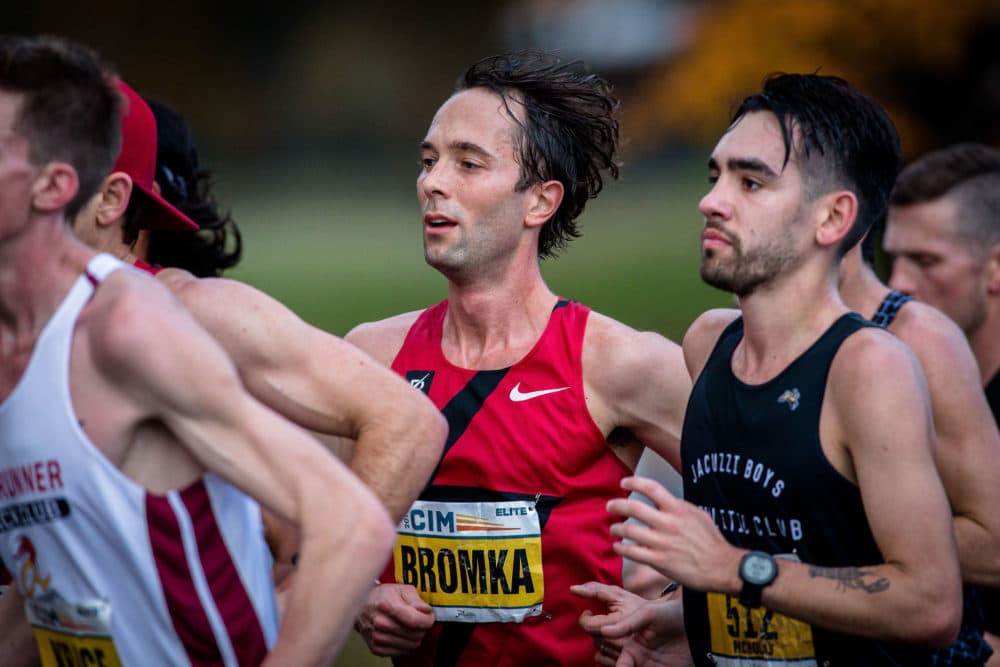
Time and effort get brittle in the latter stages of a marathon. There's no give left — in your legs or your mind. The road is hard. And the runner's margin for error becomes skeletally thin.
"How closely were you watching your watch at that point?" I ask.
"I was definitely glancing at my watch and being, like, 'Is that really true? Are you sure that's all the seconds I have to play with?' " Peter says. "And there was this growing tenseness of: 'It's getting close. It's getting close.' And then I hit a quarter mile to go, and my teammates were standing there, and they just screamed, 'You gotta go! You gotta go!' And it was terrifying and exciting.
"And I just started sprinting as hard as I could. And as I turned that corner, I saw that it said 2:18 and some seconds. And I just started to kick as hard as I could. I almost didn't make it to the finish. Every stride of the last 100 meters, I almost fell over.
"My official finishing time was 2:19:02," Peter says. "In road racing, they round up to the nearest second. And so, on my watch that I split when I started and finished, it was 2:19:01.5. So a second and a half off the goal."
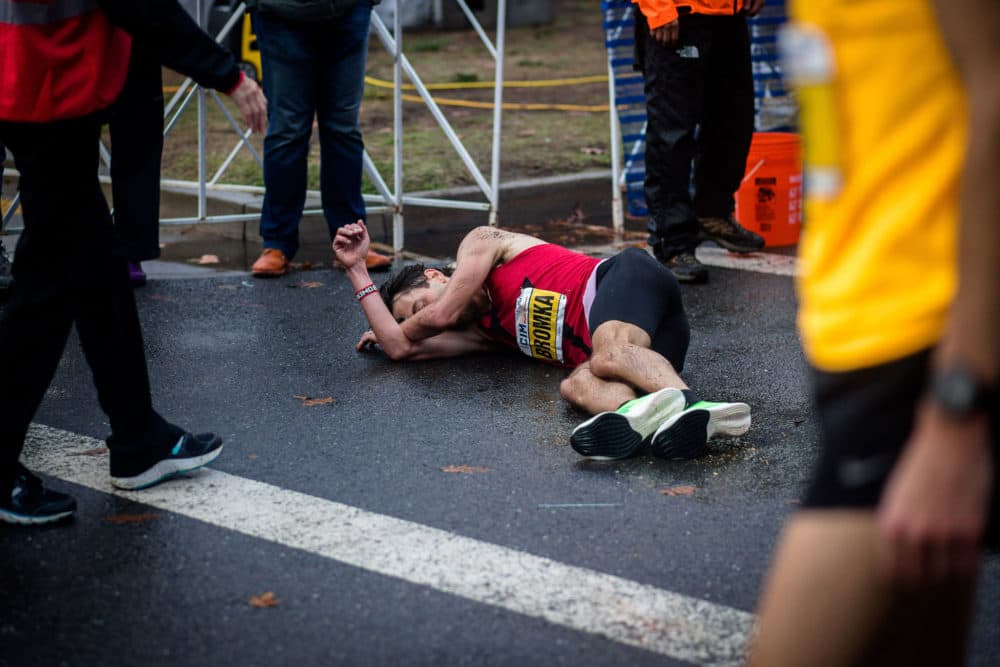
"If you had one word to describe how you felt 10 minutes after crossing the line that day, what would it be?" I ask.
"Disbelief," Peter says.
A week out: "Frustration," he says.
A month out: "Acceptance."
"So how long did it take for you to take aim at Houston?" I ask.
Peter chuckles.
"Somewhere around acceptance?" I ask.
"Yeah," he responds.
A Change In The Game Plan
Here is where Peter’s story deviates from the script, when he takes that meticulous, regimented, time-tested marathoner's playbook — of 12-week build-ups and carefully choreographed workouts — and he throws it out the window.
A short six weeks after emptying the tank at the California International Marathon, Peter flew to Texas and toed the line at the 2020 Houston Marathon in search of those two elusive seconds.
"Houston is on Jan. 19. It's the final day to qualify for the 2020 Trials," Peter says. "And so I headed to Houston, and it honestly wasn't until about 12 hours before the race that I was genuinely, genuinely excited to run the race."
The day of the marathon, Peter came through the halfway point in nearly the same time as he had in Sacramento the month before. But then the course turned into the wind, and Peter felt his pace slow.
"I almost gave up, basically," Peter says. "I almost — I contemplated dropping out at that point 'cause I'm like, 'Well, what's the point of being here other than to try to run under 2:19?' The idea of running those final miles slower than pace and finishing in a fine time, a time I would've loved years ago but not under the qualifier, sounded so hard emotionally and so hard physically.
The Final Attempt
"But right about that point, about mile 15, I got caught by the pack of guys that had gone out right on pace and that had the two pacemakers. And so I said, 'You know what? I have to run with these men, and I don't have a choice.'
"There’s nothing to look at. There's no clocks to look at. There's no watches to look at that matter. Because if they suddenly are running too slow, I am incapable of going ahead. So I have to just throw myself in their hands and just try to stay with them.
"And sure enough, even though it was mental torment, I was able to keep up with them. There was an energy there, and they were just humming along, running really good splits, such that, you know, 40 minutes later, I'm looking at my watch going, 'Wait a second, we still have a chance at this.' "
"Forty minutes later, I'm looking at my watch going, 'Wait a second, we still have a chance at this.' "
Peter Bromka
Peter ran with that pack until it splintered apart at mile 23.
"I realized I was going to have to run the final three miles basically alone, and I just ran as hard as I could," Peter says. "But, you know, again, you have a sense of these things, and I had a sense that I was going to be slightly over, and I ended up finishing 2:19:20.
The Best Runner Not At The Qualifiers
"It sounds silly, but I texted Patrick after the race. I said — I just texted him: 'I'm sorry.' I said, 'I know I don’t have to say that. And I know that you know I gave it my all.' But on some real level, like, we promised each other we would be there for each other in Atlanta, and I didn't get it done."
Peter Bromka had run three 2:19 marathons in a year, making him the fastest and most consistent performer not to be on the line in Atlanta.
Runners live and breathe by the clock. It’s the only yardstick they have to measure progress. The watch never lies. But sometimes it doesn't tell the whole story.
"How are you a better runner? Or perhaps, more broadly, how do you think you're a better person for having gone through the triple qualifying effort?" I ask.
"It was an amazing experience," Peter says. "I'm both stronger than I ever thought I could be. And I've had the opportunity to, three different times, run faster than I ever thought I could run. So, you know, you can say I failed three times, or you could say I've spent six hours running at a pace that would have been otherworldly to me until my teammates and I set our hopes on it.
"And that feeling, that internal strength and that actual experience is pretty remarkable. And so, it's this thing of, like, if you surround yourself with other people who believe in this crazy thing, and you set out a plan and you go after it, you can get really far."
It’s a message for the marathoner — and the timekeeper — in all of us. Make your time matter. Every minute. Each second. Make meaning of them all.
"Just one last question for you: what's next?" I ask. "Where are you going to be on Feb. 29?"
"Oh, I will be at the trials in Atlanta," Peter says. "As painful as it feels like to be there, it would feel 10 times more painful not to be there, mostly because my teammates will be there, and I wouldn't miss it for the world to support them."
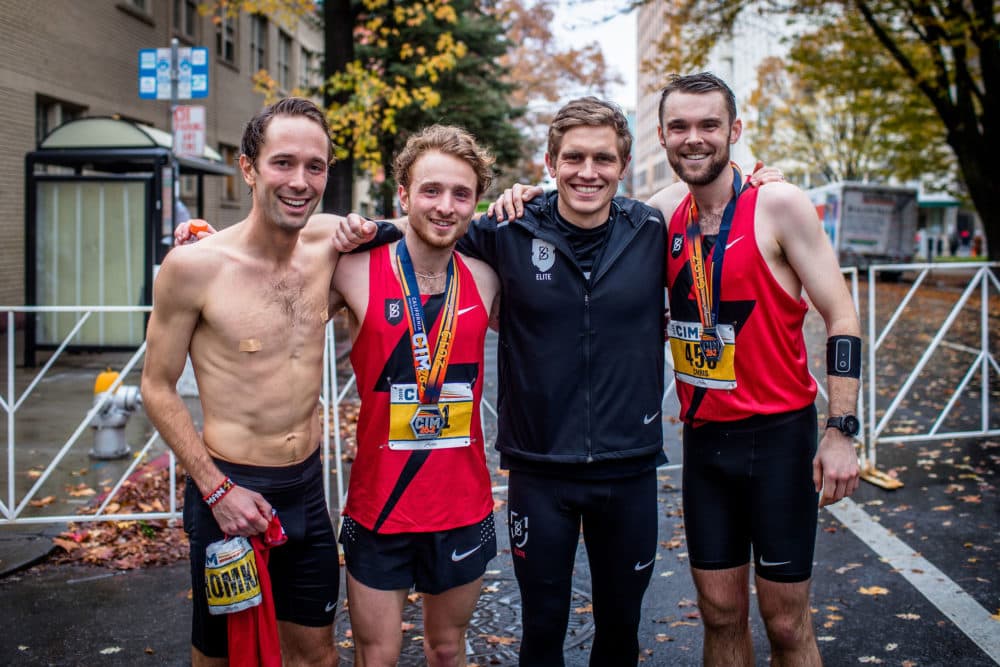
This segment aired on February 29, 2020.
